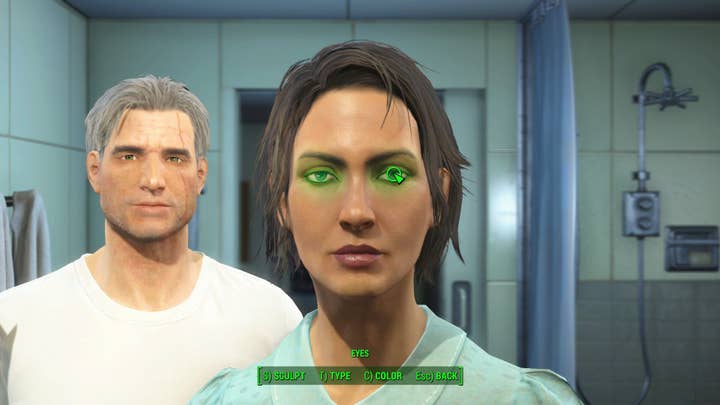Using player-avatar relations to make more engaging and successful games
Avatars can be the key to offering more intense and satisfying game experiences, and inspiring loyalty among players
Players can develop strong and complex connections with their avatars, each one unique and with important implications for game design.
Playing Bioshock Infinite can be considered both an exciting and a deeply emotional experience. Players can ride Skylines around a floating city and use both firearms and magic spells to fight their enemies. They also develop a connection with the runaway heir to the city and uncover the tragic past that gives the protagonist his purpose.
Booker DeWitt is, however, not a man. For all intents and purposes, he is nothing more than a voice and a pair of floating hands. It's through the relationship that emerges between the player and Booker though that such an experience is made possible.
Players may see avatars as representations of their ideal selves, get angry at the choices they make, or even fall in love with them
Player-avatar relations can manifest in many ways. Some may spend hours carefully customizing a new character in World of Warcraft, while others might enjoy the feeling of jumping from a rooftop and clinging to a ledge they get from Mirror's Edge. Players may also see avatars as representations of their ideal selves, get angry at the choices they make, or even fall in love with them.
The different types of connections players establish and the number of effects they can have on their experience may seem overwhelming. The following article is a summary of findings from 28 studies on the topic, from interviews and surveys, to scale validations and experiments. We think that both game designers and user researchers will find the information we gathered useful.
Embodiment
A couple of minutes into a game session, players may start feeling like they are inside the game, or that at least that part of them is. They feel like their hands are the ones holding the steering wheel in Forza Horizon, or that they just evaded a dangerous blow to their chests in Sekiro: Shadows Die Twice. Embodiment experiences may take vastly different forms too, most of them desirable. Players want to feel like they are swinging through New York as Spider-Man, sneaking into an enemy base as Solid Snake, or picking up berries in Stardew Valley.

At first, promoting the feeling of embodiment seems pretty straightforward. Using natural interfaces -- like playing a golf game with a motion controller resembling a club -- can make players feel like they are on the tee-box. In addition, customization options like being able to choose the avatar's gender and physical appearance increase the feeling that the avatar's body is an extension of ourselves.
But research has found other, less predictable factors. Having control over more abstract features, like the skills and special abilities a character will have, as well as the in-game rewards it will receive, tends to promote embodiment. Using a realistic avatar seems to have a similar effect.
In the case of virtual reality, people are more likely to see an avatar as an extension of themselves when it comes in the form of a complete body instead of just a pair of floating controllers. This can also make them feel more in control and even improve their performance, although many of these feelings can dissipate if there is a delay in the controls.
Provoking the right reaction in an audience can sometimes be a bit tricky. Filmmakers, for example, play a romantic melody or place tears in a character's eyes to intensify the viewers emotional response -- but this can have the opposite effect if viewers see it as an attempt to manipulate them. Something similar can occur when the avatar´s expressiveness becomes an obstacle for embodiment.
A couple of minutes into a game session, players may start feeling like they are inside the game, or that at least that part of them is
Players of the atmospheric horror game Amnesia: The Dark Descent could hear the avatar breathing heavily and his heartbeat accelerate every time they got a glimpse of a monster. This was intended to make the game even scarier. Instead, an experiment showed that it made the avatar feel less like an extension of the player's body and reduced fear.
While these cues were congruent with the setting and what the avatar was witnessing, they were also exaggerated in comparison to the players reactions. As a result, they probably made the differences between avatar and player more evident, making it harder for them to feel like they were inside the game.
Attractiveness and likability
Although realistic approaches to avatar design are not uncommon, most characters tend to be given attractive features like beautiful eyes, charming facial expressions and mannerisms, as well as healthy and strong bodies. And while this might be an effective way to capture the player's attention, research indicates that there are other interesting effects.
Players stand closer to a physically attractive character, making it easier to admire their features, but it also makes them seem friendlier and more likable -- this might be important, as players who like a character usually want them to succeed. They also seem to be better at understanding the character's feelings, something that could lead to more emotional involvement in story-driven games.

According to studies, likable avatars make it easier for the player to feel like they are inside the game, and lead to more excitement and positive emotions during gameplay. In addition, playing with attractive and likable avatars intensifies the experience of flow and promotes online game loyalty.
Finally, attractiveness is not the only way to make characters likable. Giving the player different customization options, allowing virtual reality avatars to express their emotions through facial expressions (visible through a mirror), and even adding a story to an otherwise mechanical game can also make avatars more likable.
Physical similarity
Players want to feel immersed in the game environment, whether this involves becoming a ruthless vigilante of The Commonwealth in Fallout 4 or a friendly villager in Animal Crossing. It's not surprising, then, that many end up creating an avatar that looks like themselves.
According to studies, likable avatars make it easier for the player to feel like they are inside the game
Avatars can end up having the same facial structure and body type as the player. They might also wear similar clothing and have matching scars or tattoos, as long as the game allows it. Customization options are evidently necessary for players to feel physically similar to the avatar. According to research, though, being able to choose a character's skills may also increase the feeling of physical similarity.
Looking like the avatar -- or at least perceiving a certain level of similarity -- has some interesting effects on the player experience. For example, people who feel that their avatar is similar to them tend to put more effort into in-game tasks. They are also more likely to feel like they are inside the game, perceive the controls as more intuitive, and find the game overall more enjoyable.
Similarity can also elicit negative emotions, though. People playing Skyrim with an avatar that looked like them felt guiltier after attacking a group of aggressive civilians seeking refuge in a cave. Difficult moral dilemmas can even lead to less identification; forcing the player to choose between two unacceptable alternatives, for example, tends to reduce the feeling of similarity, but this depends on how important morality is for the player's identity.
Wishful identification
Players use customization options to build ideal versions of themselves, too. They may give their avatar an athletic figure to satisfy their need for a healthier body, or an elegant attire before trying this style in real life. Ideal selves, however, involve more than just physical attributes.
People playing Skyrim with an avatar that looked like them felt guiltier after attacking a group of aggressive civilians
The skills and virtues of a playable character can also be found admirable and desirable, and may even lead to imitation. Players may, for example, play as an honorable character in The Witcher 3 and see this as a motivator to be kinder to other people.
Certain aspects of the player experience can also be affected. Playing with an ideal version of themselves tends to make in-game actions feel more representative of the player's actual intent. In other words, it allows the players to feel more autonomy, a factor connected to deeper and more meaningful game experiences. It also makes the controls seem more intuitive and leads to more immersion, positive affect, and motivation to play the game.
In a similar manner, wishful identification can also be effected by taking away control from the player. Facing an impossible choice, for example, reduces the player's desire to be like the avatar.
Perspective-taking
As their relationship with the avatar develops, players may start experiencing what happens to the character as if it was happening to them -- a connection that strengthens if the avatar is perceived as being similar to them or to an ideal version of themselves. Players of Bioshock Infinite, for example, don't just know Booker Dewitt feels guilty for what could happen to Elizabeth, they feel guilty the moment they lose sight of her.

The more complex the similarities between the avatar and the player, the more varied and meaningful the effects they will have. Players may find themselves controlling an avatar that has a similar background, and went through the same experiences or struggles. This can make players feel like they are not alone and lead them to reflect about their lives.
Avatars may also display the same values as the player -- a similarity that many people feel compelled to protect, affecting the choices made in the game. Players might, for example, choose to protect a village in Far Cry 4 not because it's something the main character would do, but because they want the character arc to reflect their own moral code.
Parasocial relationships
Before video games, people used to spend hours watching and listening to a stranger on a screen. As timed passed they started to see these personalities as someone close to them. Parasocial relationships, as they are called, can also develop between avatars and players, but the interactive nature of games makes the process far more interesting.
A study revealed that people expressed more concern for a realistic character when they displayed depression, anxiety or self-doubt
Interactivity allows players to be more than passive observers. They can decide how their avatar dresses, influence what they say, make choices for them, and even give them presents. As a result, player-avatar relationships end up looking a lot like a fully social relationship.
Reports have shown that players can feel empowered by a skilled and charismatic avatar, admire the virtues of a non-playable character, feel gratitude towards an ally, and show respect for an honorable enemy. But they can also feel responsible for the safety of a character the game has left under their protection, or become infatuated with another and try to develop a relationship with them.
Each type of relationship may influence the game experience in a different way. For example, those who feel responsible for their avatar's well-being tend to experience more positive feelings related to understanding the character. They are also more likely to help them achieve their objectives, as well as think about the personal implications of the story.
Interestingly, while players don't seem to perceive their virtual protégés as defenseless, they are nevertheless more likely to protect a character who doesn't seem to be doing very well. A study revealed, for example, that people expressed more concern for a realistic character when they displayed traits like depression, anxiety or self-doubt.
Avatars can increase the feeling of being transported to another world, and satisfy the need to feel connected to others
The capacity to develop romantic feelings for a fictional character, on the other hand, is something different types of media have learned to benefit from. But while it's true that many story-driven games include strong romantic plots, no genre has mastered this technique as well as visual novels.
Romantic games, like dating simulators, use a first-person perspective and hide most of their avatar's features, making it easier for the player to see themselves as the protagonist. But even when characterization is limited to voiceover and on-screen dialogue, the relationship between avatar and player shouldn't be ignored.
Avatars are, in a way, the middle-man in the relationship between the player and non-playable characters, making them an essential component of dating simulators. A study found, for example, that people tended to have a stronger connection with their in-game crush when they experienced more empathy towards their own avatars and felt motivated to help them achieve their goals.
Conclusion
Avatars can be the key to offering more intense and satisfying game experiences. They can increase the feeling of being transported to another world, provide an enhanced sense of agency, and satisfy the need to feel connected to others. In the process they make games more fun and engaging, and players more loyal. But in order to take advantage of them, understanding the relationship between players and the characters they control becomes essential.
Hugo Aranzaes is a game psychologist who has written scientific articles about games and animation for different websites. He has a strong interest in game UX research and the psychology of storytelling. He is also a huge fan of Studio Ghibli, Batman and The Legend of Zelda. He can be found on Twitter at @hugoaranzaes.
